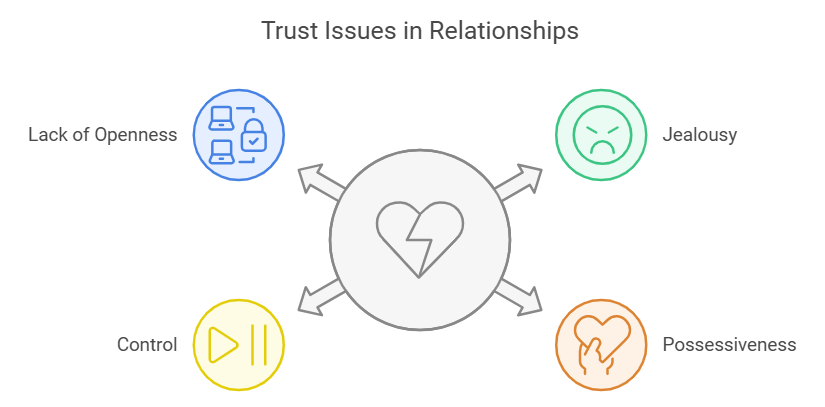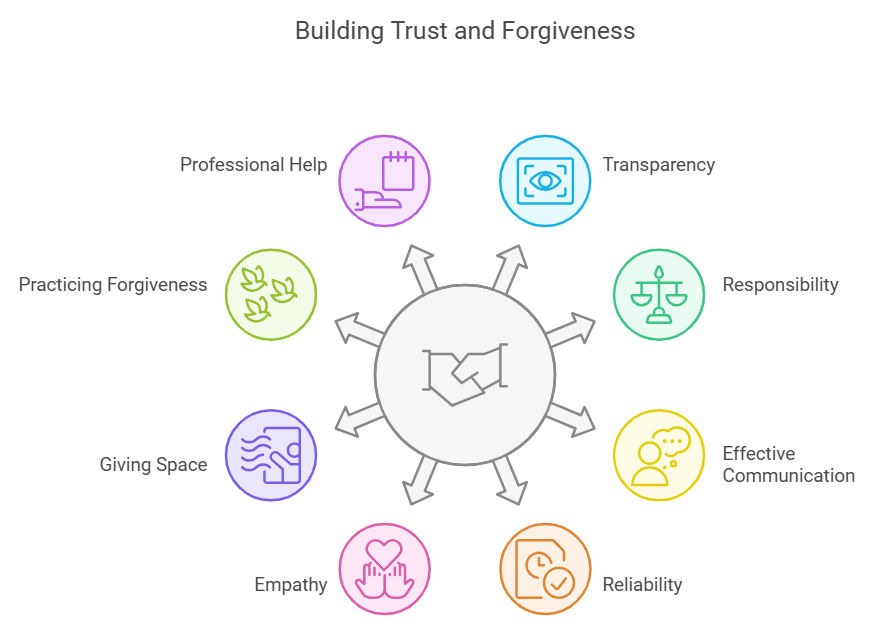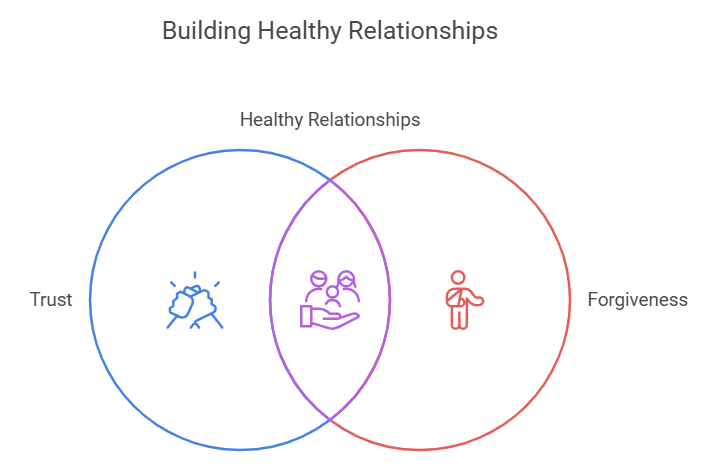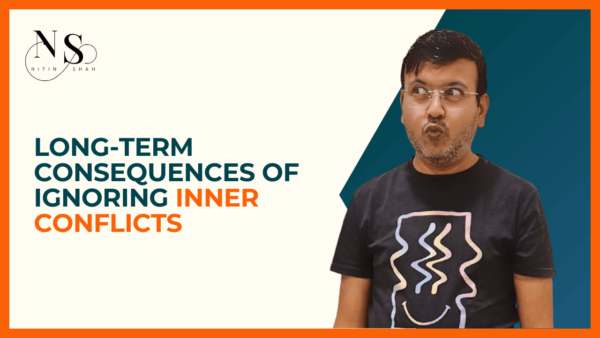Dealing with trust issues in relationships can be a difficult and overwhelming task, but it is not impossible. In the book “Destiny of Choice” by Nitin, the author emphasises the importance of self-awareness, self-reflection, open and honest communication, setting boundaries, and forgiveness in creating healthy relationships.
This blog will delve into these key themes and provide practical tips and strategies for dealing with trust issues in relationships.
Understanding trust issues in relationships
Trust issues in relationships can be defined as a lack of trust in one’s partner. Trust issues can stem from past experiences, insecurities, or a lack of understanding of the dynamics of trust. Trust issues can cause significant problems in relationships, such as feelings of insecurity, jealousy, and even emotional or physical abuse.

Common causes of trust issues in relationships include past experiences of betrayal, fear of abandonment, and insecurities. Past experiences of betrayal can cause individuals to be more sceptical and guarded in their current relationships. Fear of abandonment can cause individuals to be more possessive and controlling in their relationships. Insecurities can also cause individuals to have trust issues in their relationships.
Signs and symptoms of trust issues in relationships include jealousy, possessiveness, control, and a lack of openness and honesty. Individuals with trust issues may find it difficult to trust their partners, maybe overly possessive, or may try to control their partners. They may also have difficulty being open and honest with their partners.
The role of self-awareness and self-reflection in dealing with trust issues
Self-awareness and self-reflection are crucial in understanding and dealing with trust issues in relationships. In the book “Destiny of Choice”, the author Nitin emphasizes the importance of self-awareness and self-reflection in personal growth and development. By becoming more self-aware and engaging in self-reflection, individuals can better understand their trust issues and how they may be impacting their relationships.
One way to improve self-awareness is through journaling. Writing down thoughts and feelings can help individuals better understand their emotions and behaviours. Another way to improve self-awareness is through therapy or counselling. A therapist can help individuals understand their trust issues and provide coping strategies.
Communicating effectively and setting boundaries
Effective communication and setting boundaries are crucial in dealing with trust issues in relationships. In the book “Destiny of Choice”, the author Nitin emphasizes the importance of open and honest communication and setting healthy boundaries in relationships.
Effective communication involves being open and honest with one’s partner. It is important to share thoughts and feelings with one’s partner, even if they may be uncomfortable or difficult to talk about. Setting boundaries involves setting limits on what is acceptable behaviour in the relationship. This can include setting limits on possessiveness, jealousy, and control.
Building trust and forgiveness in relationships
Trust and forgiveness are essential components of any healthy relationship. Without trust, feeling secure and connected with your partner is difficult. And without forgiveness, it is easy to hold onto past hurt and resentment, which can prevent you from moving forward and growing together.
Tips and strategies for building trust and forgiveness in relationships:
- Be transparent and honest with your partner. Share your thoughts, feelings, and intentions with them, and be open to hearing theirs as well.
- Take responsibility for your actions. If you make a mistake, own up to it and apologize. Show your partner that you are willing to take responsibility for your actions and make amends.
- Communicate regularly and effectively. Make sure to set aside time to talk about important issues and check in with each other regularly.
- Show your partner that you are reliable and dependable. Follow through on your promises and be there for them when they need you.
- Practice empathy and understanding. Try to see things from your partner’s perspective and understand where they are coming from.
- Give your partner space and time. Trust takes time to build, so give your partner space and time to process their feelings and thoughts.
- Practice forgiveness. Let go of past hurt and resentment, and make a conscious effort to forgive your partner for their mistakes.
- Seek professional help if necessary. If trust issues are deeply rooted and are causing problems in your relationship, consider seeking the help of a therapist or counsellor.

By following these tips, strategies and techniques, you can work on building trust and forgiveness in your relationship, which will help you create a stronger and more loving bond with your partner.
Mind Management Techniques that can help build trust and forgive
- Guided visualization: Using hypnosis, individuals can visualize themselves in a situation where they are able to trust and forgive their partner. This can help them overcome trust issues and forgive their partner for past mistakes.
- Affirmations: Positive affirmations can be used to reprogram the mind to believe in trust and forgiveness. For example, “I trust my partner, and I forgive them for their past mistakes” can be used as an affirmation.
- Regression: This technique can be used to help individuals identify the root cause of their trust issues, which can then be addressed and resolved through hypnosis.
- Reframing: This technique can change how individuals perceive their partner’s actions and behavior, which can help them trust and forgive them more easily. For example, reframing “My partner always lies to me” to “My partner has lied to me in the past, but I trust that they will be honest with me in the future” can help individuals trust their partner more.
- Anchoring: This technique can be used to associate positive emotions with the idea of trusting and forgiving one’s partner. By repeatedly linking positive emotions to these concepts, individuals can learn to trust and forgive their partner more easily.
- Mirroring: This technique can be used to understand and empathize with one’s partner, which can help to build trust and forgiveness in the relationship. By mirroring one’s partner’s body language, tone of voice and words, individuals can show that they understand and accept their partner’s perspective.
- Mindfulness meditation: Mindfulness meditation can be used to help individuals focus on the present moment and let go of past negative experiences and feelings. This can help them to trust and forgive their partner more easily.
- Couples therapy: Couples therapy can be a valuable tool for building trust and forgiveness in a relationship. A therapist can help couples to identify the root cause of their trust issues and provide them with strategies for building trust and forgiveness.
- Emotionally Focused Therapy (EFT): EFT is a therapy that focuses on emotional connection and bonding. It can help couples build trust and forgiveness by addressing both partners’ emotional needs and concerns.
Tools that you can use for forgiveness and building trust:
- Communication journals: Communication journals can be used to encourage open and honest communication between partners. By writing down their thoughts, feelings, and concerns, individuals can share them with their partners, which can help to build trust and forgiveness.
- Gratitude journals: Gratitude journals can be used to focus on the positive aspects of the relationship and appreciate the partner for their contributions. This can help to build trust and forgiveness by fostering a positive and supportive environment in the relationship.
- Couple’s App: Couple’s App can be used to provide couples with daily tips and exercises for building trust and forgiveness. It can also be used to track progress and share information with a therapist or counsellor.

Conclusion
In conclusion, trust and forgiveness are key components of healthy relationships. By understanding the causes and signs of trust issues, practicing self-awareness and self-reflection, communicating effectively and setting boundaries, and using techniques and tools from hypnosis, NLP, and other related fields, individuals can work towards building trust and forgiveness in their relationships.
Nitin’s book “Destiny of Choice” provides valuable insights and practical strategies for personal growth and development in relationships. We encourage you to pick up a copy of the book and apply the tips and strategies discussed in this article to improve your relationships.




